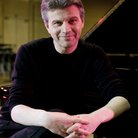John Ireland: Piano Concerto in Eb major - Full Works Concert Highlight of the Week
An unrequited love inspired John Ireland's brilliant piano concerto, writes Jane Jones.
The composer John Ireland was already aged 51 when he produced his Piano Concerto in Eb major. Up until then he was mainly known as a 'miniaturist' who produced tone poems, piano pieces and songs. Perhaps it was has fascination for his pupil and protégée Helen Perkin that inspired such a late flowering of musical genius.
In December 1926, at the age of 47, Ireland married a 17-year-old pupil of his, Dorothy Phillips. But he regretted his actions immediately and the unconsummated marriage was dissolved after nine months. Two years later he became attracted to the brilliant young 19-year old pianist Helen Perkin and not only wrote this Piano Concerto for her but made sure she performed it at the premiere at a Queen’s Hall Promenade Concert, an event which made both their names. There's even a musical quotation from a student string quartet she had composed woven into the piano concerto's second movement.
The work was seen at the time as a British response to Prokofiev’s Third Piano Concerto, and was deemed to be extremely modern at the time. How bold of Ireland to use dance band mutes on the trumpets, and even a Chinese block to rap out a rhythm! Unusually, the concerto is also in two movements with the music moving straight from the slow movement into a fizzing finale.
Ireland's work was an immediate success, and for 40 years it was considered the outstanding British piano concerto, performed by all the leading players of the day such as Clifford Curzon, Moura Lympany and Artur Rubinstein.
The work's magic has lasted longer than Ireland's relationship with Helen Perkin. Much to the composer's disappointment, she took up with an architect George Mountford Adie, married him and emigrated to Australia. As a result Ireland withdrew his dedication of the work to Helen.
Despite the sadness that surrounded its genesis, the Piano Concerto signalled a late-flowering maturity for John Ireland and led on to the major works by which he is best known today – including A London Overture and the film music for The Overlanders.


